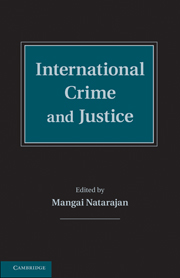Book contents
- Frontmatter
- Contents
- List of Figures
- List of Tables
- List of Contributors
- Foreword
- Preface
- Introduction
- Part I International Criminology
- Part II Law, Punishment, and Crime Control Philosophies of the World
- Part III Transnational Crime
- Part IV Organized Crime and Terrorism
- Part V International crime
- 39 Genocide, War Crimes, and Crimes against Humanity
- 40 History of Genocide
- 41 Apartheid
- 42 War Crimes
- 43 The Crime of Aggression
- Part VI Delivering International Justice
- Part VII International Cooperation and Criminal Justice
- Part VIII International Research and Crime Statistics
- Part IX International research resources
- World Map
- Index
- References
39 - Genocide, War Crimes, and Crimes against Humanity
Published online by Cambridge University Press: 05 October 2014
- Frontmatter
- Contents
- List of Figures
- List of Tables
- List of Contributors
- Foreword
- Preface
- Introduction
- Part I International Criminology
- Part II Law, Punishment, and Crime Control Philosophies of the World
- Part III Transnational Crime
- Part IV Organized Crime and Terrorism
- Part V International crime
- 39 Genocide, War Crimes, and Crimes against Humanity
- 40 History of Genocide
- 41 Apartheid
- 42 War Crimes
- 43 The Crime of Aggression
- Part VI Delivering International Justice
- Part VII International Cooperation and Criminal Justice
- Part VIII International Research and Crime Statistics
- Part IX International research resources
- World Map
- Index
- References
Summary
INTRODUCTION
The atrocities that have been associated with genocide, war crimes, and crimes against humanity have been witnessed throughout human history. Whether in times of war, or in times of peace, human wrongs have been committed against fellow human beings, often in a systematic or widespread manner, irrespective of existing moral and legal restraints. While each of these concepts has followed its own trajectory, there are considerable overlaps among them; overlaps which progressive codification and evolving jurisprudence have both confirmed and reaffirmed in an effort to prevent and punish the commission of such acts.
WAR CRIMES
“War crimes” refers to serious violations of treaty and customary rules applicable in situations of international and noninternational armed conflict. The body of rules and customs that address issues pertaining to armed conflict situations is known as the laws of war, or international humanitarian law (IHL). The term IHL, although increasingly used by many analysts and commentators, is resisted by others because it is viewed as reflecting the influence of human rights law on the laws of war and as privileging one section of the laws of war, known as “Geneva law,” over the other, known as “Hague law.” The latter section of IHL (“Hague law”) includes the set of rules and regulations found in The Hague Conventions that cover the various categories of lawful combatants and issues relating to the means and methods of warfare, as well as to the treatment of those who do not take part in hostilities (civilians) or are hors de combat (wounded and sick, prisoners of war). The former section (“Geneva law”) refers to the set of rules found in the 1949 Geneva Conventions and the 1977 Additional Protocols (I and II), and cover issues that relate to the treatment of those who do not, or no longer, take part in hostilities (Cassesse 2003).
- Type
- Chapter
- Information
- International Crime and Justice , pp. 299 - 305Publisher: Cambridge University PressPrint publication year: 2010



